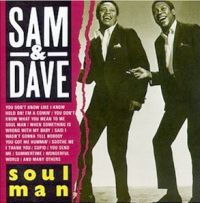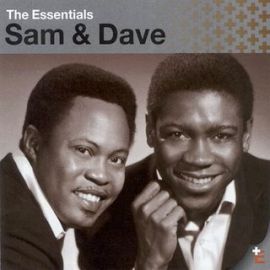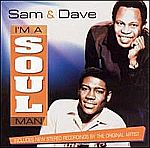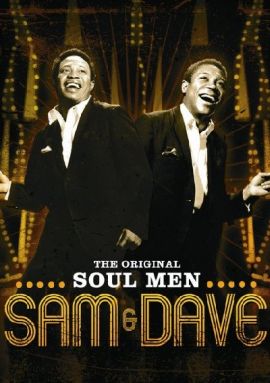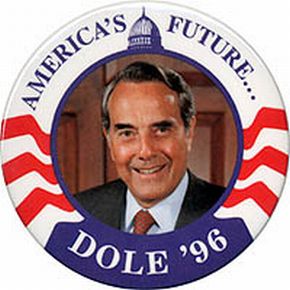
One of the campaign buttons used in the 1996 Presidential campaign of U.S. Senator Bob Dole (R-KS).
Bob Dole, a popular World War II veteran and much respected member of Congress, was first elected to national office in 1960. He became involved in Presidential politics in 1976 when he served as Gerald Ford’s running mate in a losing contest to the Democrat’s slate of Jimmy Carter and Walter Mondale. Again in 1980 and 1988, Dole sought the Republican presidential nomination, losing out both times in the primaries, respectively, to Ronald Reagan and George Bush, Sr.
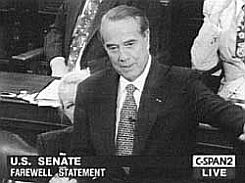
Bob Dole on Senate floor, June 11, 1996, announcing his farewell to colleagues to focus on his Presidential bid.
“Soul Man”
In the summer of 1996, Sam Moore, who 30 years earlier was a member of the rock n’ roll duo “Sam & Dave,” re-recorded a 1967 hit song that he and partner Dave Prater had made popular, entitled “Soul Man.” Moore adapted the song for use in Bob Dole’s campaign, keeping the same underlying sound and melody but adding a few new lyrics.
In the process, the song’s namesake and chief refrain of “I’m a soul man” became “I’m a Dole man.” Dole then started using the song at his campaign rallies.
The lyrics and origins of this song, however — coming out of Detroit’s inner city and forming the beginnings of 1960s African American soul music — were somewhat far afield from the conservative heritage of Kansan Bob Dole.
|
“Soul Man” Coming to you on a dusty road [Refrain] Got what I got the hard way [Repeat refrain] [Repeat refrain…] I’m talking about a soul man, |
Song History
“Soul Man” was written in 1967 by Isaac Hayes and David Porter who then worked in Detroit for the Stax record label of Atlantic Records. At least part of the inspiration for “Soul Man” reportedly came to Hayes in July 1967, in the aftermath of the 12th Street riot in Detroit, Michigan.
During those troubled days, black Detroit residents had selectively marked certain buildings with the word “soul” to protect them from damage. The buildings so marked where mostly stores or other structures owned and/or operated by African-Americans.
In the midst of those times, Hayes and songwriting partner David Porter were moved to write something that captured “a story about one’s struggle to rise above his present conditions,” as well as a song that conveyed a measure of pride — almost a kind boasting — as in, “I’m a soul man, and proud of it.”
Music Player
“I’m A Soul Man”-1967
In any case, Hayes and Porter crafted the song and lyrics that summer. Singers Sam Moore and Dave Prater recorded it on the Stax record label, with the musical backing of the house band at the time, Booker T. & the M.G.’s, a band that had their own hit songs, such as the 1962 instrumental, “Green Onions.” But Sam and Dave’s “Soul Man” was issued in the summer of 1967. It became the most successful Stax single to date upon its release.
During October-November 1967, the single peaked at No. 1 on the Billboard Hot Black Singles chart for about seven weeks, and at No. 2 on the Billboard Hot 100 for about three weeks. It stayed in the Top 40 for nearly three months.
Early Soul Artists
“Soul Man” was the first successful pop hit single for Sam and Dave. An earlier song, “Hold On, I’m Comin”, had been a No. 1 hit on the R& B charts in the summer of 1966. “Soul Man” was later followed by other hits through 1968, including: “I Thank You”, “When Something is Wrong with My Baby”, “Wrap It Up”, and others.
In the 1965-168 period, Sam & Dave were especially successful on the R&B chart, scoring ten consecutive Top 20 singles and three consecutive Top 10 albums. Their crossover appeal to white pop audiences helped pave the way for a major break out of what came to be known as soul music. “Soul Man,” in fact, was one of the first songs by a black group to top the pop charts using the word “soul”, helping define that genre. “Soul Man” was a No. 2 pop hit in November 1967. “Soul Man” was awarded the 1968 Grammy Award for Best Rhythm & Blues Group Performance, Vocal or Instrumental. Over the years, the song has also been recognized for its influence by the Grammy Hall of Fame, the Rock & Roll Hall of Fame, Rolling Stone magazine, and RIAA Songs of the Century. The song, re-recorded by Sam Moore and Lou Reed, was also featured as the soundtrack and title for a 1986 film Soul Man, a movie about a white guy who pretends to be black so he can get a scholarship to Harvard. In 1988, Sam Moore’s original partner, Dave Prater, was killed in an automobile accident. In 1992, Moore and his former partner were inducted into the Rock ‘n Roll Hall of Fame. Moore thereafter continued his own career, recording and performing through the 1990s. In 1994, his visibility increased somewhat after he did a duet with Conway Twitty on “Rainy Night In Georgia.” Then in 1996 Moore became involved with Bob Dole’s campaign.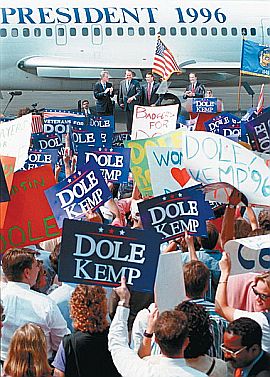
Bob Dole speaks at a campaign rally in Madison, September 5, 1996. Photo by Joseph W. Jackson III, Wisconsin State Journal.
Politics & Music
Politicians for years have sought slogans, catchy jingles, and popular music to use in their campaigns. For Franklin Roosevelt in the 1930s it was “Happy Days are Here Again,” also a perennial favorite of Democrats and practically any candidate who wins. One of FDR’s later Democrat rivals, Al Smith, used “East Side, West Side” in one of his campaigns. Jack Kennedy in 1960 had Frank Sinatra sing a little ditty for his campaign. And in recent years, some politicians have sought to associate themselves with one or another genre of music or particular musicians, all to curry favor with certain voter blocs.
In the 1992 campaign, candidate and then Arkansas Governor, Bill Clinton, had made good use of a baby boomer- favored Fleetwood Mac tune, “Don’t Stop” (a use which initially brought some objection from songwriter and band member Christine McVie, who in early 1992 asked Governor Bill Clinton to stop using it). By 1996, Dole, who was then 73 years old, wanted music that helped him reach younger audiences. “Soul Man” was a good jumpy tune, and could get folks in a good mood, part of the role of any campaign music. Sam Moore had re-written the lyrics for the campaign, with some lines that — at least in one version — purposely spoofed Dole’s age, which was something of an issue in the campaign. But the song also included a few digs that were aimed at the opposition, such as: “And he [Dole] ain’t from Hope, and he don’t have no girl friends, no!” The Dole team liked what they heard and began using the song pretty regularly at rallies and campaign stops.
In 1996, of course, Bob Dole wasn’t the only candidate using popular music during the campaign season. In fact, as the two political conventions rolled out that August, a whole range of music was used as part each party’s respective “show,” ever mindful of the TV and listening audiences — as well as the need to fire up convention delegates.
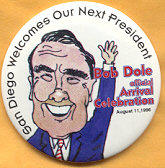
Campaign button for Republican Convention, San Diego, CA, August 1996.
“…So the band in San Diego had a role like Paul Shaffer’s group on The Late Show With David Letterman. Each top speaker was ushered in like a talk-show guest, with a theme [song] that had a more or less obvious allusion: state songs for elected officials, ‘Stars and Stripes Forever’ for Gen. Colin L. Powell, ‘My Girl’ for the nominee’s wife, Elizabeth Dole.

1996 Republican campaign button featuring the Bob Dole-Jack Kemp ticket.
Bob Dole made his entrance to the theme from ‘Rocky,’ seeking the mantle of the good-hearted, hard-punching, working-class underdog. After Mr. Dole’s acceptance speech, in which he invoked the honorable values of past eras, the country singer Travis Tritt sang a stern postscript, declaring, ‘I wish I could turn the clock back to the way my daddy said it was before.’…
When the Republican band wanted to ratchet up enthusiasm, it turned to soul standards. Mr. Dole’s theme on the road has been ‘Dole Man’… ‘Shout,’ the Isley Brothers song, provided the beat for the convention’s biggest floor demonstration. Mr. Dole has been denouncing the indulgences of the generation represented by Bill Clinton, but he has latched on to baby-boomer favorites for the campaign…..”
At the Democratic convention, too, a range of pop tunes and live performances were prominent parts of the program, from the cast of the Broadway play Rent performing “Seasons of Love” and Emmylou Harris singing “Abraham, Martin and John,” to Aretha Franklin doing the national anthem. There was also a hint of Chicago’s “Beginnings” following Clinton’s acceptance speech, with its Latin percussion, big-band horns, and lyrics that promised “only the beginning, only just the start.”
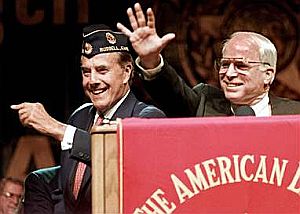
In September 1996, Bob Dole was joined by his ally Sen. John McCain, R-Ariz., at the American Legion's convention in Salt Lake City.
“Dole Man” Continues
Following the conventions, and into September, Dole’s campaign continued using Sam Moore’s “Dole Man” adaptation at its rallies. However, it turned out that Sam Moore was not really in a position to grant Dole the legal right to use this song, even in its variant and parody forms with adjusted lyrics. For Sam Moore neither owned the song nor its music publishing rights. The song was written by Isaac Hayes and David Porter as described above, and publishing company Rondor Music International Inc.,also had some control over the song’s rights and use. Rondor was owned by Jerry Moss and Herb Alpert, who were politically liberal. The holders of music publishing rights can object to the use of the composition if it is used in ways that can be seen as “commercial,” or if the song is at risk of losing its integrity, as in this case, by changing words, such as from “soul” to “Dole.”
Rondor Music sent a letter to the Dole campaign threatening to sue if the campaign continued to use the song. Rondor did not agree with the claim by the Dole camp that their use of the song was “fair use”as parody. “…[P]eople may get the impression that David [Porter] and I endorse Bob Dole, which we don’t.”
– Isaac Hayes, Sept 1996 In the September 10th, 1996 letter to Dole, Rondor threatened to sue Dole for up to $100,000 each time the song was played at an event. Rondor said that the campaign’s altering the lyrics resulted in an “unauthorized derivative work” that required permission to use. There were also other issues involved, not the least of which was an aura of endorsement the song gave to Dole by association, suggesting the song’s creators were Dole backers. “Soul Man’s” co-writer, Isaac Hayes, spoke out about the song’s use in an interview with the New York Daily News. “Nobody gave any permission here,” Hayes said referring to Dole’s use of the song without permission. “As a U.S. Senator, he ought to know that you can’t do that. It also bothers me because people may get the impression that David [Porter] and I endorse Bob Dole, which we don’t.” In the end, however, no legal action transpired, as the Dole campaign quit using “I’m a Dole Man.”
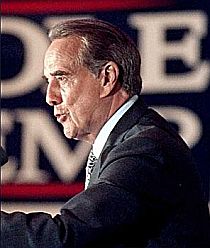
Bob Dole on the stump, 1996.
Press Critique
In addition to the legal threats, a few press accounts ran that were critical of Dole for using the tune. Charles Memminger of the Honolulu Star-Bulletin, for example, offered some of his views in a September 13, 1996 column, having a little fun at Dole’s expense:
“…Playing a hip song like ‘Soul Man’ is supposed make people forget that Dole is older than time. The usual routine is for Dole to bound onto the stage like a mummified rock star while the crowd sings ‘I’m a Dole Man! I’m a Dole Man!’ Republicans can be so cool when they have to be.
Actually, I thought the choice of song was kind of stupid. Half the time, I thought the crowd was bellowing ‘I’m a Dull Man.’ Or ‘I’m a Sold Man.’ It left just too much room for misinterpretation.…Connecting Bob Dole to ‘Soul Man’ is like con- necting Jeffrey Dahmer [mass murderer] to ‘Feel- ings.’
-Charles Memminger
Honolulu Star-Bulletin
It may not matter, since Rondor Music International, which owns the song, says it’ll sue if Dole doesn’t give up their ‘Soul.’
I think Dole has a legal leg to stand on, since song parodies are considered free speech. And anyone who doesn’t consider “Dole Man” a parody doesn’t understand irony. Connecting Bob Dole to ‘Soul Man’ is like connecting Jeffrey Dahmer [mass murderer] to ‘Feelings.’
Anyway, this is a battle Dole doesn’t have to fight. There are a lot of other songs out there he could rip off that would give him the same chance — which is to say very little — of overcoming his 20 point poll deficit to Bill Clinton…”
Mark Steyn, writing in Slate.com in October 1996 observed that “Soul Man” was “so un-Dole.” He also called it a parody, adding: “Dole obviously has never heard of it, any more than he’s heard of Tupac Shakur or those other gangsta rappers his advisers periodically call on him to denounce…” More ironic, continued Steyn, “is that the song is an exquisite musicalization of the candidate’s most frequently cited defect: his campaign’s lack of any central theme. ‘Dole Man’ isn’t about anything at all….”
Springsteen & Rabbitt
Bob Dole’s troubles with campaign music, however, didn’t end with “Soul Man.” Looking for other music to use in place of “Soul Man,” Dole’s campaign came up with Bruce Springsteen’s “Born in the U.S.A.” which was used in early October 1996 as a Bob Dole caravan rolled into Red Bank, New Jersey for a campaign rally.That prompted Springsteen himself to write an open letter to his local newspaper, The Press of Asbury Park, New Jersey: “I read in The Press this morning that my music was appropriated for the Republican rally for Bob Dole in Red Bank yesterday. Just for the record, I’d like to make clear that it was used without my permission and I am not a supporter of the Republican ticket.”
Dole’s campaign then went the country music route, asking for permission to use the song “American Boy” by Eddie Rabbitt, a song released in 1990 from Rabbitt’s Jersey Boy album, shown below. The song was quite popular then, reaching No. 11 on country charts, Rabbitt’s first in the Top 40. The song was also especially popular among U.S. servicemen and their families during the 1991 Gulf War. The song, for many Dole supporters, was seen as a much more appropriate “Bob Dole” tune.
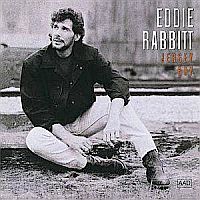
Bob Dole’s campaign found some compatible campaign music in Eddie Rabbitt’s ‘American Boy’. Click for CD.
I’m an American boy.
Drive me a Chevy, ain’t got no Peugeot.
My older brother was a G.I.-Joe.
Red, white and blue from my head to my toes.
I’m an American boy.
The song also includes, at certain points, words and speech excerpts from Martin Luther King Jr., Neil Armstrong and John F. Kennedy. In October 1996, Dole’s campaign asked Rabbitt for permission to use the song at their political rallies, with Dole reportedly saying in the request: “I’m really a big fan and I really enjoy your music and I really like your song.” Rabbitt gave Dole’s campaign permission to use the song, personally responding, “with my pleasure, you can use my song.” For a time, the Dole campaign was also using the theme from Rocky, the 1976 Sylvester Stallone film.
Sam & Dole
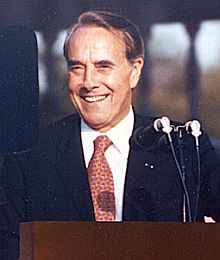
Bob Dole photo, 1990s.
In January, 1997 at a White House ceremony, Dole was awarded the Presidential Medal of Freedom, an award made to persons deemed to have made especially meritorious contributions to the nation. Dole also served as the National Chairman of the World War II Memorial Campaign for the monument that was constructed in Washington, D.C. Back in his home state of Kansas, meanwhile, The Robert J. Dole Institute of Politics was opened at the University of Kansas in July 2003. The $11 million, 28,000-square-foot facility houses Dole’s papers and hosts frequent political events and seminars. Dole’s 1996 opponent, Bill Clinton, gave one of the first “Bob Dole Lectures” there in 2004.
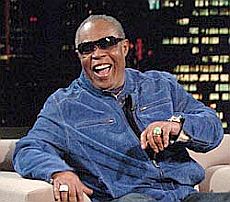
Sam Moore on 'The Tavis Smiley Show,' Sept 2007.
However, in one interesting turn of events in the 2008 presidential election, Sam Moore once again became involved with political campaign music. In 2008, Moore sent a cease and desist letter to Barack Obama’s campaign to stop the using the Sam & Dave song “Hold On I’m Coming” at political rallies. Yet, apparently there were no hard feelings here, as in January 2009, Moore performed with Sting and Elvis Costello at one of Barack Obama’s inaugural balls.
Additional stories at this website on music and politics, include, for example: “I Won’t Back Down,1989-2008″ (on the use of Tom Petty’s song by Republicans and Democrats and other venues); “Baracuda Politics, 2008″ (on Sarah Palin and RNC’s use of the song “Baracuda” by rock group, Heart; includes RNC video); and, “Reagan & Springsteen, 1984” (about President Ronald Reagan’s campaign trail remarks mentioning Bruce Springsteen and some of his music; also includes a related George Will Washington Post column). Thanks for visiting — and if you like what you find here, please make a donation to help support the research and writing at this website. Thank you. – Jack Doyle
|
Please Support Thank You |
______________________
Date Posted: 3 December 2009
Last Update: 5 August 2019
Comments to: jdoyle@pophistorydig.com
Article Citation:
Jack Doyle, “I’m A Dole Man, 1996”
PopHistoryDig.com, December 3, 2009.
______________________
Sources, Links & Additional Information
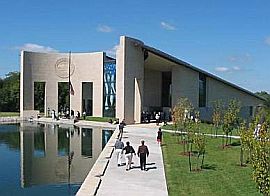 The Robert J. Dole Institute of Politics at the University of Kansas, Lawrence, Kansas. |
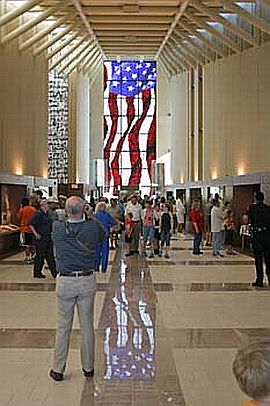 Inside the main hallway of The Robert J. Dole Institute of Politics at the University of Kansas. |
“United States Presidential Election, 1996,” Wikipedia.org.
“Sam and Dave,”in Holly George-Warren and Patricia Romanowski (eds), The Rolling Stone Encyclopedia of Rock & Roll, Rolling Stone Press, New York, 3rd Edition, 2001, p. 856.
“Sam & Dave,” Wikipedia.org, November 17, 2009.
“Samuel David Moore,” Wikipedia.org, Nov. 1, 2009.
Jon Pareles, “The Dance Within the Hit Parade,” New York Times, Saturday, August 31, 1996, p. 9.
“Nervous In San Diego,” Time, Thursday, August 15, 1996
Rob Bowman, Soulsville U.S.A.: The Story of Stax Records, New York: Schirmer Trade, 1997.
Charles Memminger, “Some Looney Tunes for The Dole Man,” Honolulu Lite, Honolulu Star-Bulletin, Friday, September 13, 1996.
Jan Uebelherr, “Striking the Wrong Chord Dole’s Deeds Irk The Boss, Bozo,” The Milwaukee Journal Sentinel, October 10, 1996.
“Dole Finally Finds an Agreeable Tune- smith,”Albany Times Union (NY), October 13, 1996.
“Dole Finds a Friend,” St. Petersburg Times, (FL) October 13, 1996.
Mark Steyn, “Theme Party: Politics Really Is a Song and Dance,” Slate.com, Wednesday, October 16, 1996.
Shana Alexander, ” ‘Call Me Al’? ‘I’m a Dole Man’?,” New York Times, November 3, 1996.
“American Boy”(Eddie Rabbitt song), Wiki- pedia.org, November 2009.
Sarah Wheaton, “Accompaniments; Theme Songs and Others,” New York Times, February 16, 2008.
Nicole Colson,”Sing a Song of Hypocrisy; Do the Political Candidates Pick the Songs That Fit Them?,” SocialistWorker.org, March 28, 2008, Issue 667.
Jack Sanders, “Springsteen, Walmart, Populism and Republicans,” IssueOriented. com, Thursday, March 19, 2009.
“The GOP in San Diego, August 12-15, 1996,” Online NewsHour: Convention ’96, PBS.
Roger L. Sadler, Electronic Media Law, Sage, 2005, p. 296.
The Robert J. Dole Institute of Politics, DoleInstitute.org, University of Kansas, Lawrence, Kansas.
One version of the “I’m a Dole Man” song had been posted earlier online at DoleTown.com.
Karen De Witt, “The 1992 Campaign: Media; MTV Puts the Campaign on Fast Forward,” New York Times, Saturday, February 8, 1992.
